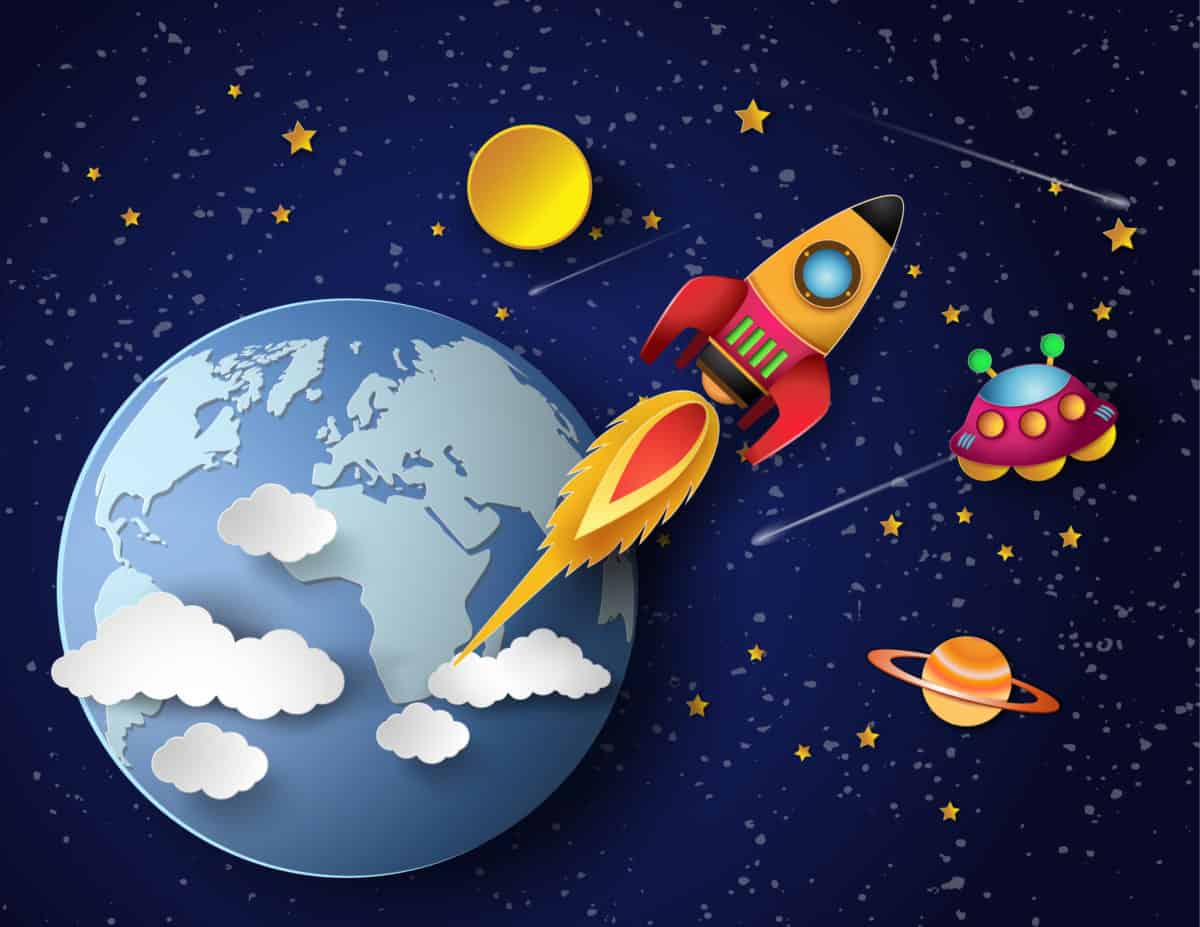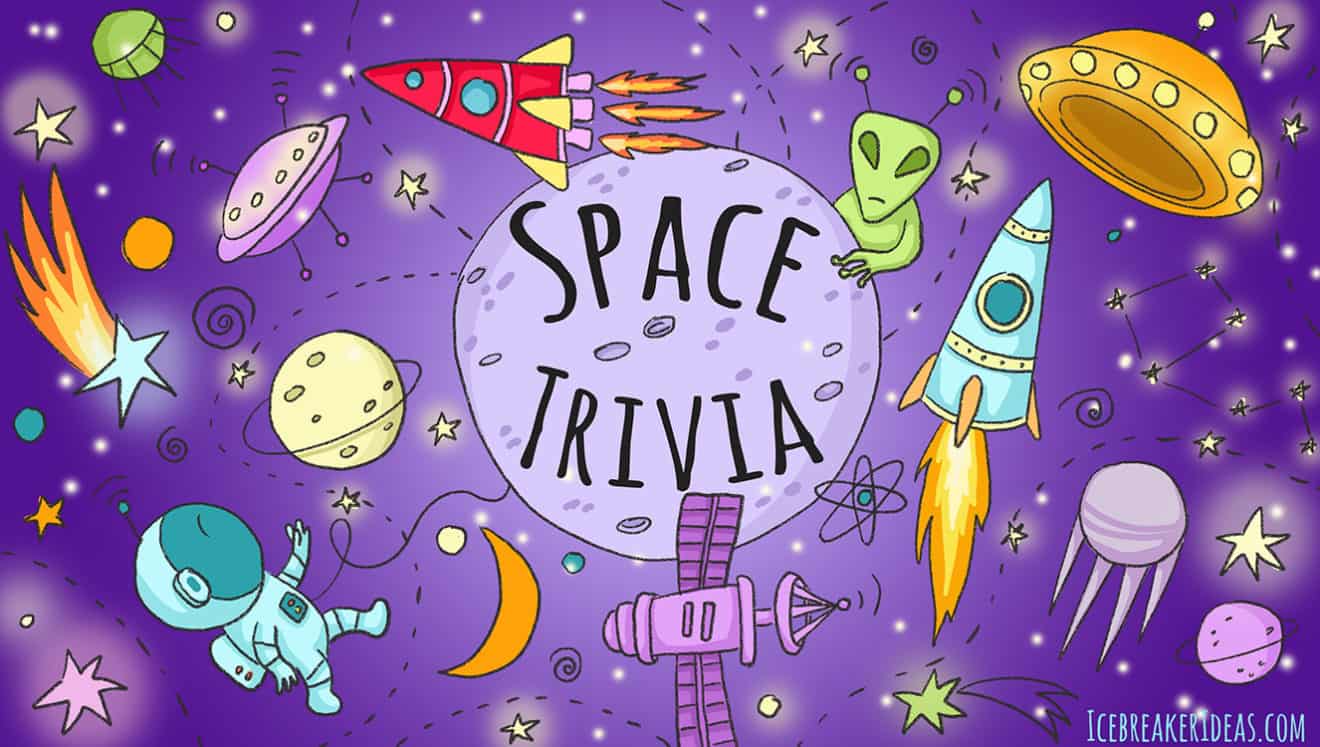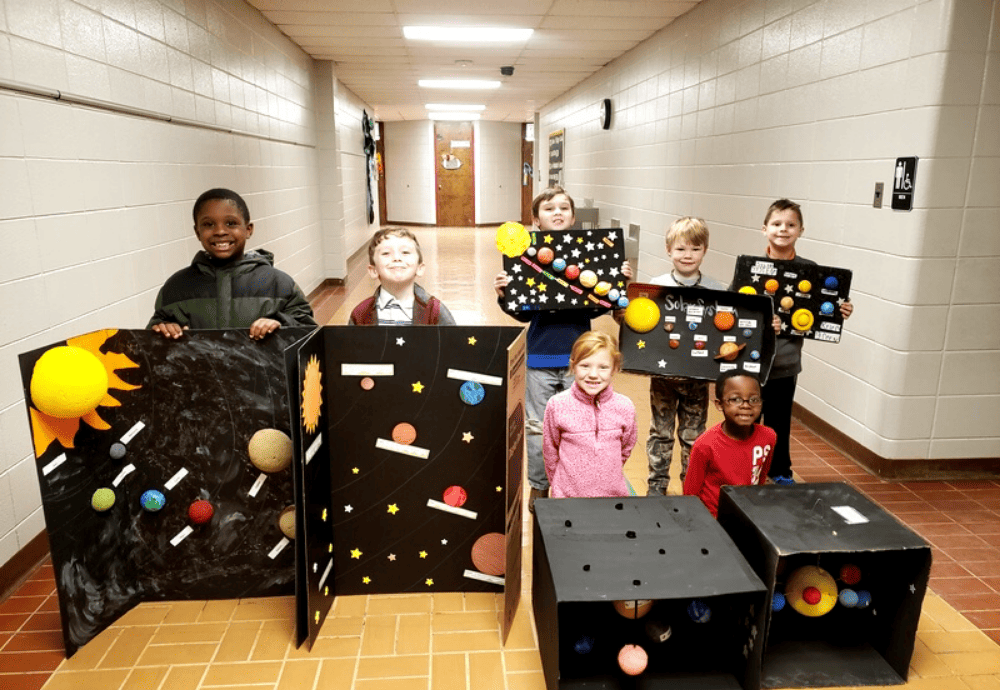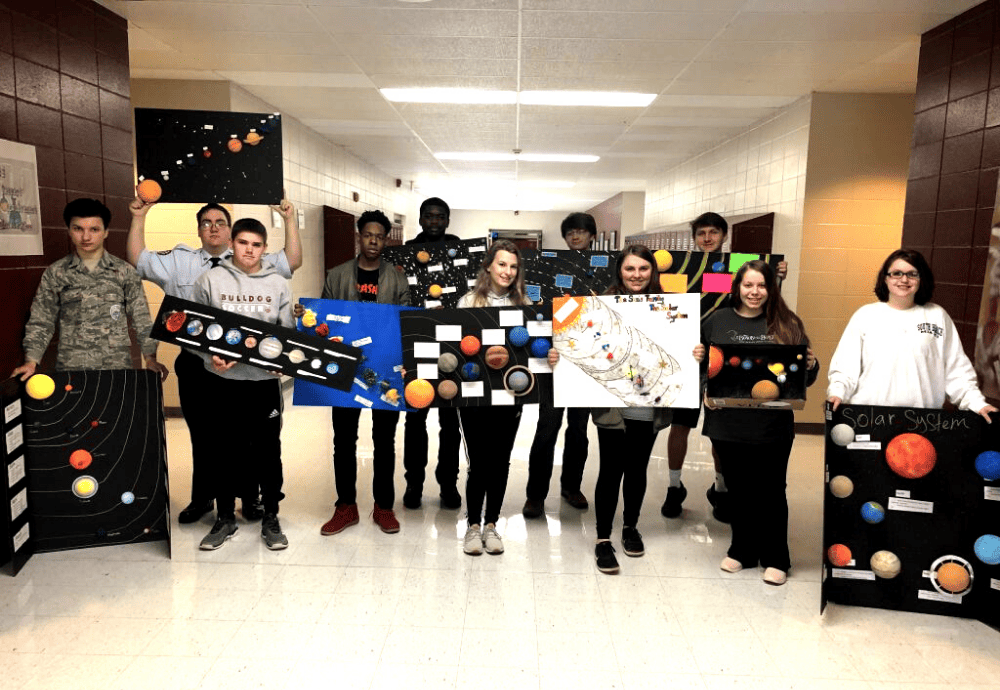Space. The universe. The final frontier. There’s nothing like delving into astronomy and getting lost in the infinitely expanding universe and all its stars. New discoveries about space are made every day. If you don’t keep up, it’s easy to fall behind.
Table of Contents
For example, did you know that Pluto is no longer a planet?
Maybe you did know that. But did you know that it’s now classified as a dwarf planet? (Do you even remember learning about dwarf planets?)
If you think you know your space stuff, check out these trivia questions.
Planetary Trivia

Time to put your sixth-grade planetary science to the test. Don’t worry; we’ll start you off with a few easy ones!
- Which is the smallest planet within our solar system?
- Which is the second smallest planet within our solar system?
- The moon called Titan orbits which planet?
- Which is the brightest planet in the night’s sky?
- Which planet is larger, Neptune or Saturn?
- Uranus has only been visited by what spacecraft?
- There have been more missions to this planet versus any other planet
- What protects Earth from meteoroids and radiation from the sun?
- How many of our planets can be seen without a telescope? (Bonus points if you can name them!)
- Phobos and Deimos are the Moons of which planet?
- Which planet is closest in size to Earth?
- Which planet has the most moons?
- Which planets have no moons?
- Which planet has supersonic winds?
- Which planet has the fastest rotation?
- How long is one year on Jupiter?
- Which is the oldest planet in our solar system?
- Which is the densest planet in our solar system?
- Which planet is known as the Morning Star?
- Which planet is known as the Evening Star?
- Which planets have rings around them?
- Which planet has the most volcanoes?
- What are the names of Jupiter’s four largest moons?
- Which planet spins backward relative to the others?
- Which are the four “gas giant” planets?
- Which are the five most recognized dwarf planets?
- In what year did Pluto become reclassified as a dwarf planet?
- Which planet rotates on its side?
- Which are the four “terrestrial” planets?
- How many moons does Earth have?
Solar System Trivia
A solar system is defined by a collection of planets (celestial bodies), moons, and the sun which they orbit around. Ours is a gravitationally bound system that includes “smaller bodies,” otherwise known as asteroids, meteoroids, and comets.
The planets beyond our solar system are referred to as “Exoplanets,” and scientists have discovered thousands of them within the past two decades alone.
According to scientists, there are also over 500 solar systems within the Milky Way, and new ones are cropping up every year. Ready to test your solar system knowledge? Let’s see what you’ve got!
- What causes a solar eclipse?
- Where can the biosphere be found?
- Where is the Oort Cloud located?
- What phenomena keeps the planets in steady orbit around the sun?
- Which is the largest start within our solar system?
- Why does Mercury have craters?
- Which star is the center of our solar system?
- How old is the sun?
- How long does it take the sun’s rays to reach Earth?
- When did the solar system form?
- If you weighed 200 pounds on Earth, how much would you weigh on Mars?
- What causes high and low tides?
- Who was the first person to walk on the moon?
- Who was the first person to travel into space?
- Who was the first woman to travel into space?
- How long does a solar eclipse last?
- What is a comet made of?
- Asteroids are also referred to as what?
- Name the three most famous asteroids
- What do you call a large number of meteoroids occurring at the same time and place?
- What color is the sun?
- What elements is the sun composed of?
- How many Earths could fit inside the sun?
- What are the explosions of energy released by the sun’s magnetic fields called?
- Where is the Asteroid Belt located?
- Which celestial body within the solar system has the most mass?
- Why isn’t it possible to walk on Jupiter, Saturn, Uranus, or Neptune?
- What is space junk?
- What color is Mars’ sunset?
Astronomy Trivia
Astronomy is the branch of science that deals with astrophysics and astrobiology. It’s most commonly referred to as “the laws of stars.”
Overall, it concerns the phenomena circulating all celestial objects. That includes the planets, moons, stars, nebulae, galaxies, and comets—plus the chemistry and physics that would explain them.
Let’s see just how much you know about our physical universe as a whole.
- Who invented astronomy?
- Name the spacecraft that carried the first astronauts to the moon
- Where can you go to see projections of the night sky?
- What is the sun’s outermost atmosphere called?
- How is the distance between the sun and Earth measured?
- How long does it take the moon to pass through all its phases?
- Who described Saturn’s rings as the “ears of a teacup?”
- Which star is the Alpha Ursa Minoris?
- What do scientists call the disk that encircles a back hole?
- How long does it take the moon to orbit the Earth?
- What do you call a large group of stars, dust, and gas?
- Who was the third astronaut to walk on the moon?
- Which astronaut is famous for having written his daughter’s initials on the moon?
- How many stars make up the Big Dipper?
- What are the storms produced by the sun called?
- Which constellation represents a hunter and weapons?
- Which constellation contains the stars Castor and Pollux?
- What is the study of the stars, planets, and galaxies?
- What causes the moon to shine?
- What is the third brightest celestial object in our sky?
- Which constellation is shaped like a winged horse?
- How does a meteor become a meteorite?
- Which star is nearest to Earth? (Hint: It’s not the sun!)
- What does NASA stand for?
- Which astrological sign becomes visible starting January 21st?
- What do you call the path traveled by a celestial body in space?
- What is the polarity reversal of the sun?
- Vesta is which type of celestial body?
- What do scientists call a massive release of plasma from the sun?
- What is a highly magnetized rotating neutron star?
- How many constellations are there?
- What is the unit of measurement used to describe the expansion of the universe?
Trivia Questions About Space
Space is no longer the “final frontier.” The universe is constantly changing, evolving, and expanding—it’ll never be final. Therefore, there will always be more to learn. Here’s a mixture of some old knowledge and some new knowledge. Let’s see if you’ve been keeping up with your space facts!
- Which are the most common types of galaxies in the universe?
- Where is the coldest place in the universe?
- Which constellation holds the hottest place in the universe?
- How old is the universe?
- How much of the universe is composed of dark matter?
- What is the most common type of star found in the Milky Way?
- What are the largest stars in the universe?
- What has an incredibly strong gravitational pull that light can’t even escape?
- How many moons are currently in our solar system?
Out of This World Space Trivia Facts
The information about the universe stretches to infinity and beyond. There’s so much to learn about, from the planets to the stars to black holes to the man on the moon; it would take a lifetime to absorb it all. To get you started, we’ve put together a list of the most exciting space facts.
Try making a game out of who knows the most facts from this list:
In space, no one can hear you scream! That’s right; space is completely silent. It has no atmosphere to provide a medium for sound waves to travel.
No one knows how many stars there are. Space knows no size—it’s endless. Therefore it’s impossible to count all the stars. Scientists make estimates based on our one galaxy, the Milky Way. However, there are beyond billions of galaxies out there, rendering everything uncountable.
NASA spacesuits cost 12 million dollars. Each.
One “day” on the planet Venus is longer than a year on Earth. By “day,” we mean 243.025 days for the planet to make a full rotation on its axis.
There is water floating around in space. About 10 billion lightyears away, there are massive vapor clouds. They hold up to 140 trillion times the water in the Earth’s oceans.
There’s a volcano three times the size of Mount Everest on Mars. It’s 600 km wide and 21 km high, to be exact, and it’s been named Olympus Mons. It also may still be active, according to scientists.
If two pieces of the same type of metal touch in space, they will bind together permanently. The process is known as cold welding, and it happens due to a lack of water and air.
There’s a planet called 55 Cancri E, and it may be made out of diamonds. Yale University scientists believe the planet’s surface is made of graphite and diamond. It’s also visible without a telescope during the constellation of Cancer.
Footprints on the moon will last for 100 million years. This is because the moon has no atmosphere, which means there’s no water or wind to erode its surface.
The Milky Way and Andromeda Galaxies will eventually collide. In about 3.75 billion years, the two galaxies will collide, forming one giant elliptical galaxy.
We won’t see Halley’s Comet until the year 2061. She only comes around once every 75 or 76 years. She was last seen in 1986.
With a surface temperature of 450 degrees celsius, Venus is the hottest planet in our solar system. (It would be Mercury, but Mercury has no atmosphere to regulate its temperatures).
There’s plenty more to learn about space and astronomy—this is just the corona of the sun if you will. We challenge you to continue learning about space, and quiz your friends and families while you’re at it!
Susan majored in English with a double minor in Humanities and Business at Arizona State University and earned a Master’s degree in Educational Administration from Liberty University. She taught grades four through twelve in both public and private schools. Subjects included English, U.S. and world history and geography, math, earth and physical science, Bible, information technologies, and creative writing.
Susan has been freelance writing for over ten years, during which time she has written and edited books, newspaper articles, biographies, book reviews, guidelines, neighborhood descriptions for realtors, Power Point presentations, resumes, and numerous other projects.





Very good quiz questions
Thank you for providing these lovely senior quizzes for our clients at an Age Care Facility
An extraordinary knoledge of Astronomy.Thanks a lot